الأسواق
عند تصميم تدخل إنساني وتحديد ما إذا كان سيتم استخدام المساعدات النقدية والقسائم، يجب أن يكون تحليل السوق جزءًا من تحليل الاستجابة الشامل. وثبت أن دعم الأسواق للعمل بشكل جيد يؤدي إلى تعافي أسرع وزيادة المرونة في المناطق المتضررة من الكوارث.
واستثمرت العديد من المنظمات في تطوير أدوات لدعم تحليل السوق وتفكر في البرمجة القائمة على السوق بشكل أكثر شمولية. يشمل ذلك التدخلات التي تستخدم السوق (مثل التحويلات النقدية إلى السكان المتضررين)، بالإضافة إلى التدخلات التي تدعم الأسواق بشكل مباشر (مثل المنح المشروطة للمتداولين لإعادة تشغيل أسواقهم).
Related initiatives
Featured content

Introduction to Market Analysis
دورة تدريبية
This 30 minute online course provides an introduction to the analysis of markets in emergency contexts, with input from some of the world’s leading thinkers on the topic.

A Practical Guide to Market Analysis in Humanitarian response
دورة تدريبية
A three to four hour online course designed to provide future humanitarian market assessment team members with a solid understanding of theory and steps of market assessments so that they can join assessment teams prepared with a basic understanding of what they will be doing and why.
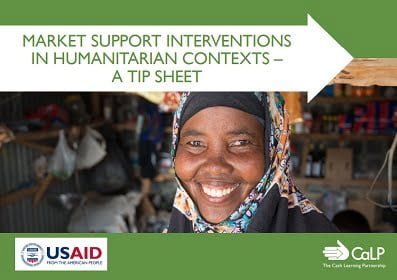
Market Support Interventions in Humanitarian Contexts – a Tip Sheet
Guidelines and Tools
This tip sheet defines what market support programming in humanitarian contexts is, and what it can look like in practice. It enables humanitarian practitioners to systematically consider market support interventions alongside other programme activities. The scope includes support interventions focusing on supply/availability and on demand/access. The tip sheet is based on secondary data...
Latest
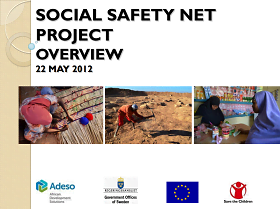
Social Safety Net Project Overview
Presentation
This presentation provides an overview of a three-year social safety net project being implemented by a consortium of Adeso and Save the Children (UK), with the overall aim to reduce community vulnerability to chronic food insecurity in two regions of Somalia/Somaliland identified as being highly...
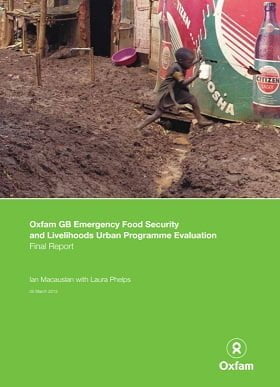
Oxfam GB Emergency Food Security and Livelihoods Urban Programme Evaluation
Report
The global urban population is now larger than the rural population. While rural areas in general remain worse off than urban areas, the number of people in urban poverty is growing fast, and urban dwellers are vulnerable to significant disasters. Development and humanitarian agencies are therefore...

Review of emergency cash coordination mechanisms in the Horn of Africa: Kenya and Somalia
Report
In response to the drought and famine in the Horn of Africa in 2011, cash transfer programming (CTP) has been used extensively as a modality to meet humanitarian needs. Partly because the conditions permitted it (functioning markets, cash economies and delivery mechanisms), and partly because delivering...

Humanitarian Exchange: Special feature. New learning in cash transfer programming
Report
The special feature of this issue of Humanitarian Exchange, co-edited with Sarah Bailey and Breanna Ridsdel, focuses on new learning in cash transfer programming. While cash is now an accepted tool, and is increasingly being used in humanitarian response, most programmes are small and gaps in analysis and...
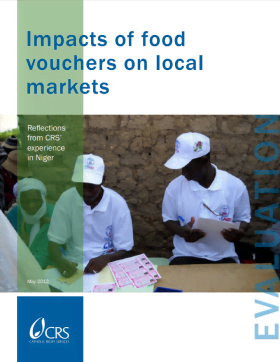
Impacts of Food Vouchers on Local Markets: Reflections from CRS’ experience in Niger
Report
In mid 2010, CRS-Niger designed and carried out a food voucher program to assist the most needy one-third of households in the departments of Ouallam and Tillabéri due to the poor harvest in 2009 (CRS, 2010). The ADVANCE project was implemented in collaboration with a local NGO partner Association pour...
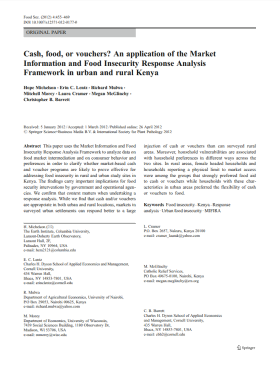
Cash, Food or Vouchers? An application of the market information and food insecurity response analysis framework in urban and rural Kenya
Policy paper
This paper uses the Market Information and Food Insecurity Response Analysis Framework to analyze data on food market intermediation and on consumer behavior and preferences in order to clarify whether market-based cash and voucher programs are likely to prove effective for addressing food insecurity...

Cash Emergency Preparedness (CEP) Pilots
Guidelines and Tools
CEP guidelines and key findings from pilot assessments.

Multi-Cluster/Sector Initial Rapid Assessment (MIRA)
Report
The immediate aftermath of a sudden-onset disaster is a critical period of time when the humanitarian and donor communities need to make key decisions on how to best support the affected country or region and its populations. However, during that brief period, limited comprehensive information on the...
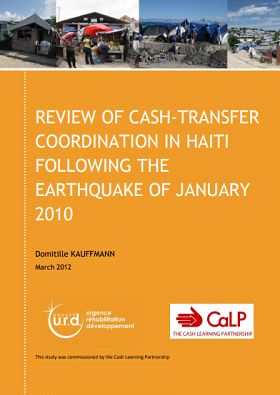
Review of Cash-transfer Coordination in Haiti following the Earthquake of January 2010
Case Study
This study, commissioned by the CALP Network, aims to review and document the coordination of cash transfer programmes (CTP) implemented from the emergency phase in Haiti. It is part of a wider review of CTP coordination in emergency situations which includes three case studies (Pakistan, Haiti and the...
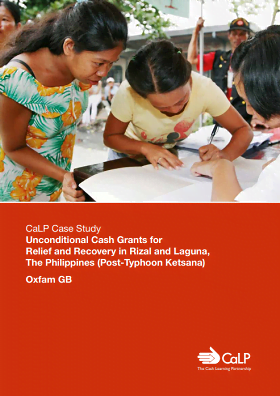
Unconditional Cash Grants for Relief and Recovery in Rizal and Laguna, The Philippines (Post-Typhoon Ketsana)
Report
In response to rapid onset flooding in Laguna and Rizal provinces in the Philippines, Oxfam International implemented a Cash Transfer Programme (CTP) in three phases: 1) Unconditional cash transfers for individuals to provide for basic needs; 2) Conditional cash transfers for individuals resuming income...

ICT/mobile Phone Technology: A shift in the right direction
Blog Post
Thirteen African nations came together for the AgriKnowledge Share Fair in Addis Ababa at the end of October 2012 to learn about approaches for quicker and more efficient humanitarian response. Government representatives, researchers, UN agencies and NGOs gathered for a three day symposium on best...

ACF Meta Evaluation: Fresh food vouchers (poster)
Report
This one-page poster shows a summary of the meta evaluation of 5 Fresh Food Voucher programmes in Bolivia, Haiti, Daadab Kenya, the oPT and Pakistan.

Comparing the Efficiency, Effectiveness and Impact of Food and Cash for Work Interventions: Lessons Learned from South Sudan
Report
In addition to food aid, which used to be the standard response to food emergencies, alternative instruments of food assistance such as cash and vouchers have increasingly been applied in emergency and transition situations in recent years. The subject of the present study was a comparative analysis of...
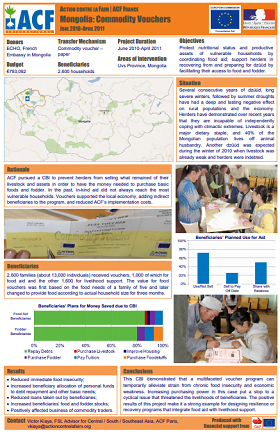
ACF Mongolia Commodity Vouchers (Poster)
Report
This one-page poster provides an overview of ACF’s commodity voucher programme in Mongolia.
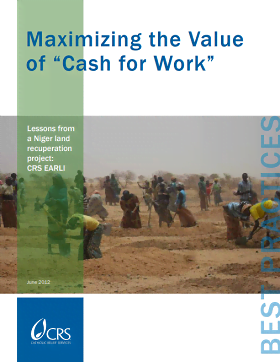
Maximizing the Value of "Cash for Work": Lessons from a Niger land recuperation project
Report
The good practices in this publication were distilled from a Real Time Evaluation (RTE) of an emergency project in Niger, implemented by Catholic Relief Services (CRS) and financed by OFDA that is using cash for work and seed fairs to address food insecurity in the departments of Ouallam and...

Cash transfer programming in urban emergencies: a toolkit for practitioners
Guidelines and Tools
In recognition of the increasing urban populations around the world and their increasing vulnerability to disasters, the the CALP Network endeavored to investigate the current status and impact of urban emergency response programs that utilise cash transfer programming. This study aims to better...
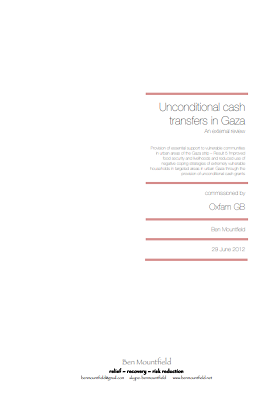
Unconditional cash transfers in Gaza: an external review
Report
This is a review of small pilot project, which targets extremely vulnerable households with monthly unconditional cash transfers for a limited period. The target population is made up of two groups, one group already receiving assistance through a voucher from WFP but still showing poor food diversity...

Cash Transfers in Nairobi’s Slums
Report
In Kenya, a combination of factors led to the food crisis of 2008–9, which put around 9.5 million people at risk of starvation. About 4.1 million of those affected were living in informal settlements (slums) in the capital, Nairobi. Oxfam and Concern Worldwide developed a joint programme to address...

Cash and Shelter: A Workshop on Using Cash Transfer Programming for Emergency and Early Recovery Shelter
Presentation
A power point presentation to provide guidance to programme managers, programme implementers and programme support staff when selecting cash as a potential response tool in emergency shelter programmes.
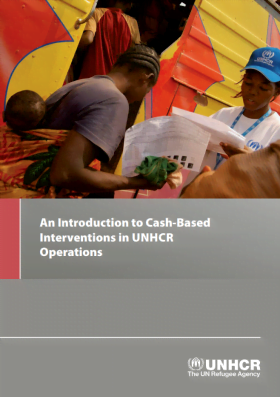
An Introduction to Cash-Based Interventions in UNHCR Operations
Policy paper
This document provides an introduction and basic guidance on the use of cash-based interventions and tackles key issues of relevance to UNHCR in the form of questions and answers. It also provides an overview of UNHCR’s experience in using cash-based interventions.